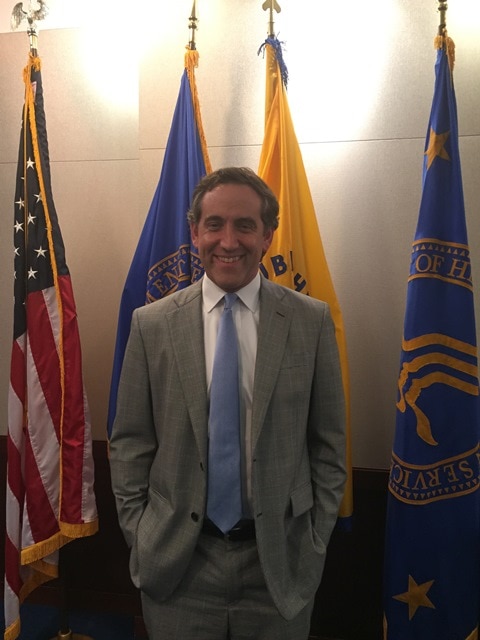By: Al Fitzpayne, HHS Chief of Staff
If you think working in Washington is tough, try coaching an 11-year-old girls’ basketball team.
For the past five years now, during the winter months, I’ve had the distinct honor and pleasure to coach my daughter’s basketball team. As a coach, I have a great example to follow here at HHS. Kevin Thurm, former HHS Deputy Secretary and current Senior Counselor to the Secretary, was actually my high school basketball coach.
Somewhere in between the drills, the defense and the reminders to stop double-dribbling, I have realized that perhaps the best thing I can teach these future WNBA all-stars is to keep a healthy lifestyle.
It’s something I am also trying to teach my 9-year-old soccer and tennis playing son as well. And as a dad, I could use a reminder myself. June is Men’s Health Month, and it’s a great time to step back and make sure we take care of ourselves.

Of course, there are the steps we take every day, like eating more fruits and vegetables, taking that morning run, and staying away from tobacco products. But we also need to reach out to a health care provider for preventive services like screenings for cholesterol, blood pressure and depression. And we can’t forget the importance of receiving your annual flu shot!
Thanks to the Affordable Care Act, many recommended preventive services are now provided by your health insurance at no out-of-pocket charge. Today, over 137 million Americans have access to preventive services without a copay, including 53.5 million men. But as the Kaiser Family Foundation has noted, we are much less likely than women to actually use these services —even if they’re free.
This might be because we’re less likely than women to have a doctor we see regularly. Whatever the reason for this, we need to do better. Our families and friends need us to focus on our health. Too many men die earlier than the women in their lives from heart disease, diabetes, both of which can be managed with some help from health care providers.
Still need affordable, quality health insurance? The next Open Enrollment period starts November 1, but you may be able to sign up for coverage through the Health Insurance Marketplace before then under special circumstances. Certain qualifying life events, like getting married, having a newborn, or changing jobs may allow you to enroll in a Special Enrollment Period. You or members of your family might also qualify for coverage through Medicaid or the Children’s Health Insurance Program (CHIP), where enrollment is year-round.
If you’re a father, you know that modeling a healthy lifestyle can have a powerful and positive impact upon the development and health of your children. Through HHS’ National Responsible Fatherhood Clearinghouse, fathers, fatherhood programs, researchers and policymakers have access to web-based tools, information, and other resources on matters of health, parenting, and economic stability. Through the Clearinghouse, we’re reaching out to neighborhoods across the country with initiatives like “Fatherhood Buzz,” which works with barbershops across the country to connect dads with local resources to help build strong families.
On June 19, I’ll be wearing blue for the “Wear Blue” campaign to raise awareness of men’s health issues and I hope you’ll join me. Wear a blue shirt, cap, ribbon, or something else blue and post a picture on social media, using #ShowUsYourBlue.
This Men’s Health Month, we can all raise awareness about the importance of men’s health and the steps we can take to live longer, healthier lives.
It can be your Father’s Day gift to your kids. I’ll be thinking about my health so my daughter can spend less time worrying about her dad, and more time perfecting her jump shot.




Nice article! One of the things that I am very blessed to have is a dad who takes his health extremely seriously. As an ER doc himself, he sees some of the worst of the worst when people who’ve failed to take proper care of themselves are brought into the ER. Prior to that, he and my mom imparted a love of an active and healthy lifestyle that continues to this day. During my dad’s exemplary career as an officer in the US Navy, he often found himself in dangerous situations. Deployed to Iraq in the early 90s during Desert Storm and again in 2008-2009, we always feared that the worst might happen. But whenever he was home and particularly after he retired from the Navy in 2010, he made sure we knew that he would never leave us as a result of a preventable health issue.
It’s a promise and a commitment that all fathers should make to their families.